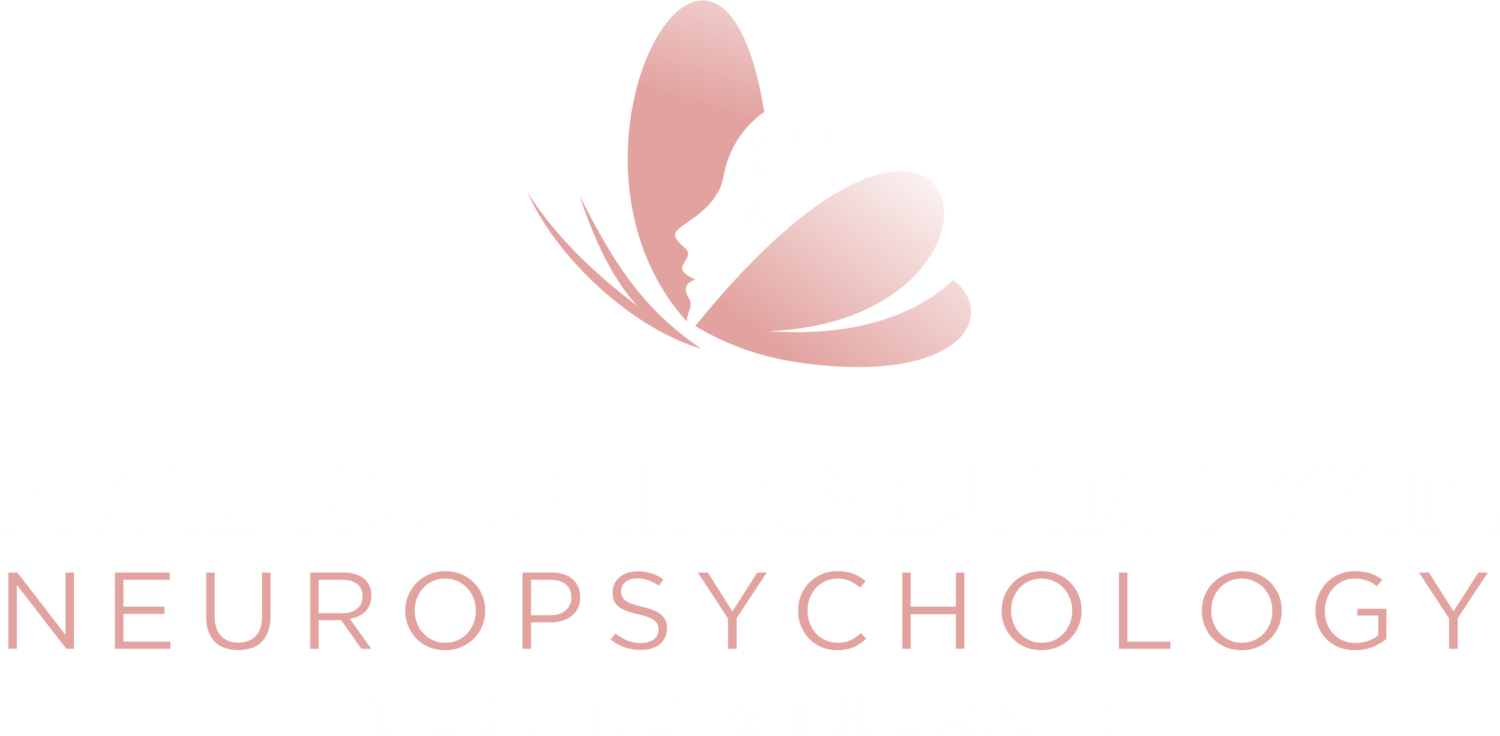
I provide evidenced-based therapy & testing services for children, adolescents & young adults
Assessment Services
Neuropsychological Assessment
A neuropsychological evaluation offers insight about your child's specific pattern of development in the areas of cognitive, social, emotional, adaptive, and personality functioning.
Read More
A neuropsychological assessment will reveal your child's unique strengths and weaknesses and their learning profile through the use of paper-and-pencil, interactive, and computerized tests. In other words, a neuropsychological evaluation will help you understand how your child’s brain functions and processes information, and how that translates in school and/or daily life. This process will give you insight into the links between how your child sees the world and how he/she learns, thinks, relates to others, and manages his/her feelings. This broad ranged view of a student is of great importance when a team (including the parents) is trying to learn how your child thinks and feels, why your child has trouble with some tasks, and what your child needs to help them thrive.
Bilingual Assessment (Farsi)
Has your child been exposed to two or more languages from birth or from a very young age (typically before 2 years old)? Or has your child learned a second language after they mastered the first? Nevertheless, a bilingual assessment is critical for children who speak more than one language and/or have been raised in a bilingual environment.
Read More
Bilingual children often demonstrate mixed profiles of language development. For example, they may be stronger in one domain of language in their primary language yet stronger in another domain of language in their secondary language. It is important to consider that many bilingual children may not demonstrate the same level of performance across domains (e.g., vocabulary learning, word knowledge, syntax, discourse, comprehension, etc.). Researchers have found that even when children are dominant in one language or the other, they often know some items in the weaker language that that they do not use in the stronger language (Bedore et al., 2005; Pena et al., 2002). Because language is learned in context, children learn vocabulary items in the language in which they hear and use them (Pearson, Fernandez, Lewedeg, & Oller, 1997); Pena et al., 2002). Therefore, a bilingual assessment is important to consider because bilingual children may exhibit different language and thinking profiles in comparison to their monolingual peers.
Independent Educational Evaluation
An independent educational evaluation (IEE) is an evaluation of a student by a qualified professional who does not work for a school district responsible for the education of the child.
Read More
The evaluation is typically initiated by a parent and/or a school district when additional information or a second opinion is needed for a child's education, placement, or services. The pediatric neuropsychologist will answer the referral questions requested from the school district. Typically, the assessor will comment on whether the student has a disability and needs special education and other services within the school environment.
Accommodation Assessment (SAT, GRE, MCAT, LSAT, GMAT)
Neuropsychological assessment is frequently requested to ascertain specific accommodations that the student is entitled to in school and testing settings.
Read More
Accommodations, such as extended time, extra breaks, and read-alouds serve to level the playing field and offer equal opportunity for the student to show what they have learned.
Accommodations are task-specific in that they are designed to reduce or eliminate the impact of the impairment on an activity. Legally, accommodations are not designed to bring out the optimum in a student, but rather to stop failure.
Forensic Assessment
A forensic assessment is a neuropsychological evaluation geared towards answering legal questions in the context of a civil or criminal case. A forensic assessment is requested by an attorney when impairment in cognitive, behavioral, social, and/or emotional functioning is suspected.
Read More
While neuroimaging is essential to understanding the structural integrity of the brain, a neuropsychological assessment allows for an examination of the brain’s functionality (e.g., cognitive abilities). A neuropsychological assessment can be used to reveal or diagnose brain dysfunction and the severity of the impairment even if no structural brain abnormalities can be seen. The evaluation typically includes a clinical interview, a comprehensive review of records, and the administration of objective, standardized cognitive and personality/behavioral measures via paper-pencil or computer tests. Due to the complexity of some forensic cases, the evaluation may require significant more time to complete.
Therapy Services
Dr. Houshiarnejad’s therapeutic services include working with individuals who experience anxiety, depression, attention-deficit/hyperactivity disorder, autism spectrum disorder, obsessive-compulsive disorder, mood and self-dysregulation, cognitive inflexibility, and difficulty navigating social relationships, among other cognitive and socioemotional challenges. Much of Dr. Houshiarnejad's therapeutic work consists of teaching skill-building tactics to help individuals have the coping strategies to effectively self-regulate or deal with adversity.
Read More
Taking a collaborative approach, Dr. Houshiarnejad strongly encourages parent involvement to help generalize coping strategies across contexts. Dr. Houshiarnejad is also skilled at providing effective parenting techniques to help manage children’s problematic behaviors while increasing family cohesion. Her focus is to give her patient's and their family concrete strategies that are tangible and that can help them immediately begin the process of transformation and guiding them to enhancing their quality of life. Rapport and motivation are imperative factors to thriving in therapy. Therefore, Dr. Houshiarnejad is committed to creating a welcoming and transparent dynamic to help increase treatment compliance and success. She uses applied science and evidenced-based methods in her therapy practice and integrates each patient’s neurocognitive profile and personal attributes, developing a customized treatment plan that becomes the platform for effective change.
Common Presenting Conditions/Issues:
Attentional Disorders (e.g., ADHD)
Academic Difficulties
Accommodations
Anxiety
Autism Spectrum Disorder
Behavioral Dysregulation (e.g., oppositional defiance)
Bipolar Disorder
Brain Tumors or Cancer
Cerebral Palsy
Chromosomal and Genetic Syndromes
Chronic Health Conditions (e.g., Diabetes)
Concussion (e.g., Sports-Related)/Traumatic Brain Injury (TBI)
Depression
Early traumatic stress or separation from caregiver
Emotional Dysregulation
Epilepsy and Seizure Disorders
Executive Disorders (e.g., initiation, working memory, planning, organization, time management, emotional dysregulation, monitoring, shifting, impulsivity)
Expert Review of Reports (Clinical and Forensic)
Fetal Alcohol Spectrum Disorders
Giftedness
Hydrocephalus
Intellectual Disability
Language and Communication Disorders
Learning Disorder (e.g., reading, writing, math)
Memory Difficulties
Meningitis and Encephalitis
Neuropsychiatric Disorders (e.g., psychosis, mood instability)
Pragmatic and Social Communication Disorders
Pre and Post-Chemotherapy
Prematurity
Social/Interpersonal or Behavioral Problems
Substance Use Disorders
Strokes
Tourette’s Syndrome/Tic Disorders
Toxic Exposure in Utero
